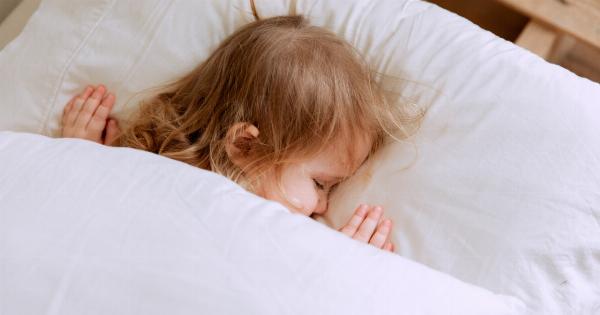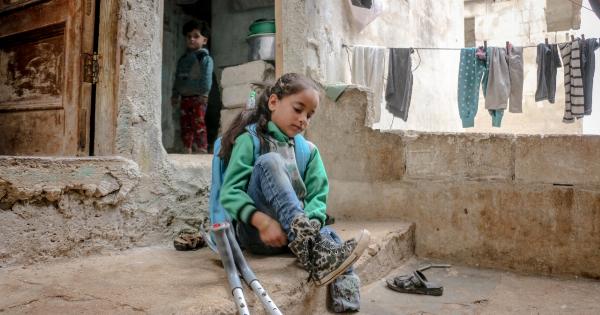Sleep plays a crucial role in a child’s overall growth and development. It is during sleep that the body repairs and regenerates itself, and the brain consolidates and processes information from the day.
Adequate sleep is essential for a child’s physical health, cognitive function, emotional well-being, and behavior. It is especially important for children as their bodies and brains are still maturing.
How much sleep do children need?
The amount of sleep a child needs varies based on their age. The American Academy of Sleep Medicine has provided the following recommendations:.
Newborns (0-3 months):
Newborns require around 14 to 17 hours of sleep per day. However, their sleep patterns are highly irregular and are typically divided into short periods throughout the day and night.
Infants (4-12 months):
Infants need about 12 to 16 hours of sleep, including both nighttime sleep and daytime naps. By the age of six months, most infants begin to consolidate their sleep into a more predictable pattern, typically with a longer stretch of sleep at night.
Toddlers (1-2 years):
Toddlers require around 11 to 14 hours of sleep per day. Most toddlers transition from two naps to one nap during this stage, typically in the afternoon.
Preschoolers (3-5 years):
Preschoolers need about 10 to 13 hours of sleep. Most children in this age group no longer require a daytime nap, but some may still benefit from short nap periods.
School-age children (6-12 years):
School-age children should aim for around 9 to 12 hours of sleep per night. As they grow, children may find it challenging to meet this recommended sleep duration due to academic, extracurricular, and social commitments.
Teenagers (13-18 years):
Teenagers need approximately 8 to 10 hours of sleep. However, the early school start times and increased homework loads often result in inadequate sleep for many teenagers.
Consequences of insufficient sleep
When children do not get enough sleep, it can significantly impact various aspects of their lives. Here are some consequences of insufficient sleep:.
Poor academic performance:
Insufficient sleep can impair a child’s ability to concentrate, retain information, and perform well in school. It can also affect their cognitive skills, such as problem-solving and critical thinking.
Behavioral problems:
Lack of sleep can lead to irritability, mood swings, and difficulties in regulating emotions.
Children may become more impulsive, have trouble controlling their impulses, and display hyperactive behavior, similar to the symptoms of attention-deficit hyperactivity disorder (ADHD).
Physical health issues:
Inadequate sleep is associated with an increased risk of obesity, diabetes, weakened immunity, and cardiovascular problems in children. It can also impact growth hormone production and disrupt proper physical development.
Ways to ensure your child gets enough sleep
It is essential for parents to prioritize and establish healthy sleep habits for their children. Here are some tips to ensure your child gets enough sleep:.
Implement a consistent bedtime routine:
A well-established bedtime routine can signal to your child that it is time to wind down and prepare for sleep. It could include activities such as bathing, brushing teeth, reading a book, and dimming the lights.
Consistency is key in making the routine effective.
Create a sleep-friendly environment:
Make sure your child’s bedroom is conducive to sleep. Ensure that the room is dark, quiet, and at a comfortable temperature. Consider using blackout curtains, white noise machines, or earplugs to minimize disruptions.
Limit screen time before bed:
Electronic devices emit blue light, which can interfere with the body’s natural sleep-wake cycle. Establish a rule to turn off screens, including smartphones, tablets, and televisions, at least an hour before bedtime.
Encourage regular exercise:
Physical activity can promote better sleep, but it is important to schedule exercise earlier in the day rather than close to bedtime. Engage your child in age-appropriate activities such as swimming, biking, or playing at the park.
Promote a relaxing bedtime environment:
Help your child wind down before sleep by engaging in calming activities such as reading a book or listening to soft music. Avoid stimulating or exciting activities close to bedtime.
Set consistent wake-up times:
Encourage your child to wake up at the same time every day, even on weekends. A regular wake-up time helps regulate the body’s internal clock, making it easier to fall asleep at night.
Establish age-appropriate sleep schedules:
Ensure that your child is getting the recommended amount of sleep for their age. Plan their bedtime and wake-up time accordingly, allowing for sufficient sleep duration.
Monitor caffeine consumption:
Limit your child’s intake of caffeinated beverages, such as soda or energy drinks, especially in the late afternoon or evening. Caffeine is a stimulant that can interfere with sleep.
Address any sleep disorders:
If you suspect that your child is consistently having trouble falling asleep or staying asleep, or if they exhibit symptoms of sleep disorders like sleep apnea or insomnia, consult a pediatrician or sleep specialist for further evaluation and appropriate treatment.
Be a sleep role model:
Parents should prioritize their own sleep health and demonstrate healthy sleep habits. Children often model their behaviors after their parents, so be mindful of your own sleep routines and create a sleep-friendly environment for yourself as well.
In conclusion
Getting enough sleep is vital for a child’s overall well-being and development. By establishing healthy sleep habits and prioritizing sleep, parents can set their children up for success, both academically and emotionally.
Remember, consistency and a supportive sleep environment are key to ensuring your child gets the sleep they need to thrive.
























